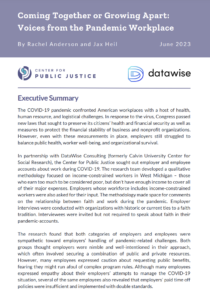The COVID-19 pandemic confronted American workplaces with a host of health, human resource, and logistical challenges. In response to the virus, Congress passed new laws that sought to preserve its citizens’ health and financial security as well as measures to protect the financial stability of business and nonprofit organizations. However, even with these measurements in place, employers still struggled to balance public health, worker well-being, and organizational survival.
In partnership with DataWise Consulting (formerly Calvin University Center for Social Research), the Center for Public Justice sought out employer and employee accounts about work during COVID-19. The research team developed a qualitative methodology focused on income-constrained workers in West Michigan – those who earn too much to be considered poor, but don’t have enough income to cover all of their major expenses. Employers whose workforce includes income-constrained workers were also asked for their input. The methodology made space for comments on the relationship between faith and work during the pandemic. Employer interviews were conducted with organizations with historic or current ties to a faith tradition. Interviewees were invited but not required to speak about faith in their pandemic-accounts.
Click here to read the full research brief and gain a deeper understanding of the evolving landscape and the path forward for faith-shaped workplaces.

